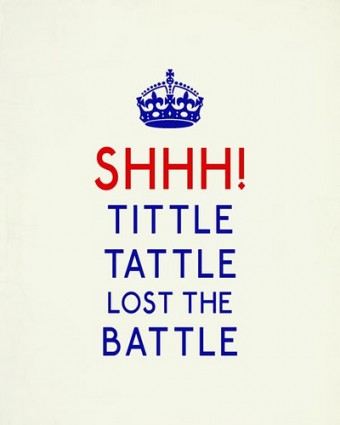What the Dot Over the Lower Case Letter “i” is Called

Expression and poster used in WWII, warning soldiers that if they idly chatted about their mission, the enemy could learn their plans.
Today I found out what the dot over the lower case letter “i” is called, namely a “tittle”.
While this isn’t a commonly used word any longer, the expression “jot or tittle” still endures in some places, meaning something to the effect of “a very small amount” or “iota”. A classic example of this expression can be seen in the Gospel of Matthew (5:18): “For assuredly, I say to you, till heaven and earth pass away, one jot or one tittle will by no means pass from the law till all is fulfilled” (NKJV)
The word “tittle” itself comes to us from the same Latin word that “title” derived from, but has since come to mean something very different, namely a small stroke or mark in writing, generally referring to the dot over the lower case letter “i”, when used at all.
Another expression that is associated with “tittle” is the expression “to a T”, being a shortened version of “to a tittle”, meaning “precise / exact down to every last detail”. As much as a hundred years before “to a T” first showed up, “to a tittle” was a common expression meaning the exact same thing as “to a T” came to mean, so it is thought the former led to the latter.
Bonus Facts:
- The first recorded use of the expression “to a tittle” was in the play Woman Hater, by Francis Beaumont and John Fletcher in 1607, which had the following line: “I’ll quote him to a tittle.”
- The terms “upper case” and “lower case” actually come to us quite recently, from the early days of the printing press. At this time, the letter blocks themselves were stored in specially organized boxes called cases. By convention, the cases containing the capital letters were stored higher than those containing the smaller versions of the letters. If one single case had compartments for all the letter blocks, the capital letters were stored in the back so that when the case was set upright, angled, they were higher, hence “upper case” and “lower case”. There were also several other such conventions with the storing of these letter blocks to make it easy for the compositor to set the type.
- There are some words that change their meaning based on whether the first letter is capitalized or not. These words are collectively known as “capitonyms”. These capitonyms are particularly troublesome when they appear at the beginning of a sentence, as there is no way, based on the single word alone, to tell which meaning is being referred to. Examples of these include: August vs. august (month vs “majestic or venerable”); Calorie vs. calorie (1000 calories vs. 1 calorie); Moon vs. moon (the Earth’s natural satellite vs. any natural satellite); Divine vs. divine (related to God vs. to discover by intuition or insight); etc.
- The word “jot”, in the expression “jot or tittle”, comes from the Greek iota or keraia (κεραία). An iota is simply the smallest letter in the Greek alphabet (ι). The word iota itself has come to mean “small” in English.
| Share the Knowledge! |
|





The print cases are called California Job Cases and were developed so that the printers could easily transport them to the California gold rush.